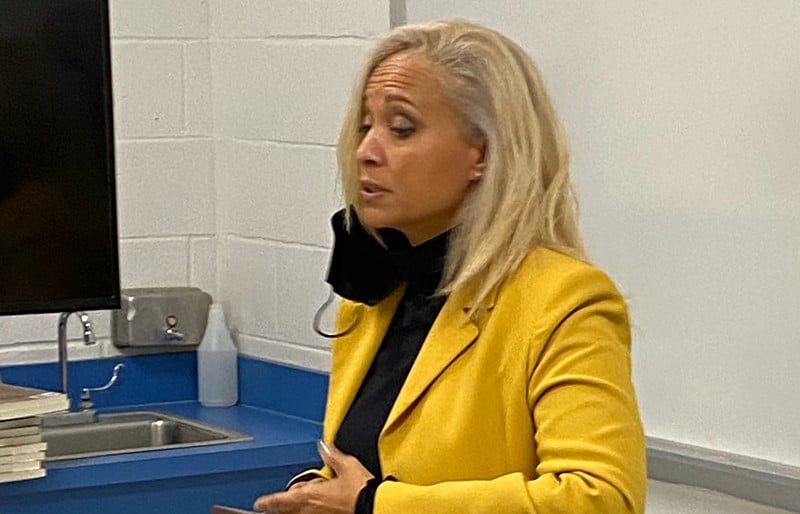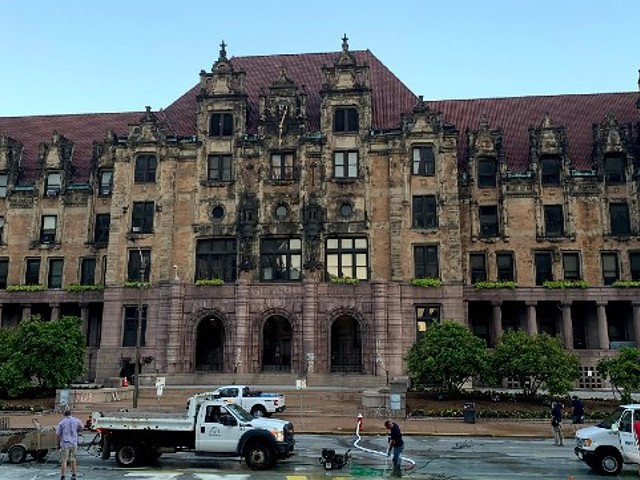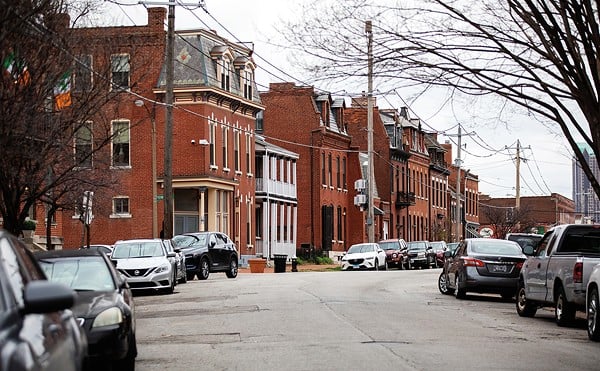
City corrections commissioner Jennifer Clemons-Abdullah speaks to a group of CJC detainees her first day on the job.
When Jennifer Clemons-Abdullah became the new commissioner of the city Division of Corrections in September, she took control of an organization that in just the past year had experienced national news-making uprisings, accusations of a culture of detainee abuse, and potential lawsuits from the federal government for civil rights violations.
In an interview with the RFT, Clemons-Abdullah says she isn't interested in "Monday morning quarterbacking" the mistakes of past administrators. Instead, she says she has listened to detainees and staff and figured out what improvements she could implement immediately.
"I came to the conclusion that first things first, we need to improve the food," Clemons-Abdullah says. The City Justice Center, the city’s primary jail, worked out a deal with their food service provider to bring more nutritional food into the facility, including more fruit and less "filler."
Before taking the job overseeing St. Louis jails, Clemons-Abdullah was an associate warden at a federal prison in Arkansas.
Other reforms she says she's implemented at the CJC include making it easier for detainees to call their families. Clemons-Abdullah also says the jail's administration is doing a better job facilitating communication between detainees, the public defender's office and judges.
"I think my biggest thing is … being able to communicate openly with the public defender's office to expedite things," Clemons-Abdullah says. "We communicate with judges and say, 'Hey, we got these guys. We need to move their court dates up. We need to get them seen.'"
Clemons-Abdullah says that she occasionally pops into the CJC unannounced at night and goes "cell to cell" talking to the detainees.
"They're seeing that I am willing to listen, but I'm not willing to listen to nonsense," she says. "You're not gonna cuss at me, you're not gonna talk crazy."
Alfred Long, a pastor and life coach who has worked for years with men in the CJC, says that on Clemons-Abdullah's first day on the job she dropped in unannounced as a group of detainees were having a graduation ceremony for a workshop he had been running.
"It was really impressive," Long says. "It lifted the morale of the men because it showed that people really cared about them."
Long adds that "[Clemons-Abdullah] definitely has a hard job. It won't happen overnight, but I have seen some small changes."
Others who have a vested interest in the CJC are pessimistic, describing the past three months at the CJC as more of the same.
"In terms of the tangible product on the ground and how it compares to the previous administration, I would say that our office on the whole thinks that it's now a little more difficult to see our clients [in the CJC]," says Matthew Mahaffey, the head of the St. Louis Trial Office of public defenders.
Mahaffey says that under Clemons-Abdullah the CJC has implemented policies preventing lawyers from taking photographs of their clients in the CJC.
Mahaffey called the policy "kind of preposterous and I think unconstitutional. If we have clients who are complaining about either the treatment there or if they had an experience related to their case prior to being brought to the jail, we need to be able to document that as part of our defense."
As far as communication between the public defender's office and the head of the city Division of Corrections, Mahaffey says "I have never received a direct email from [Clemons-Abdullah], ever."
Additionally, there continue to be reports of detainees being abused by staff.
Maureen Hanlon, a staff attorney with ArchCity Defenders says, “We have had recent reports, as of last week, of people being assaulted by corrections officers with chemical weapons."
Such reports would mirror past allegations at the CJC, which is facing a lawsuit from three detainees who say in late 2020 and early 2021 they were locked in mace-filled rooms as well as maced without warning or reason. The three detainees are being represented by Arch City.
One woman, whose son has been in the CJC for almost eighteen months, tells the RFT that her son, who she talks to almost daily, has seen few changes in his situation at the CJC.
Hanlon says, "One big problem in the jails from our perspective, is that an enormous number of people are held in either solitary confinement or near solitary confinement." Some of this is the result of COVID-19 lockdowns that have been slow to ease up. "I have not seen any improvement on that front," she adds.
Hanlon also pointed out that a federal prison is like a long-term care facility, where people stay for such a long time that the administration gets to know their needs. However, running a jail is more like running a hospital emergency room, where no one knows who is coming in at any minute and the dynamics and needs are constantly changing.
Hanlon says that "only time will tell" how well Clemons-Abdullah's most recent job in the federal Bureau of Prisons has equipped her for her current role.
Clemons-Abdullah for her part says that the biggest difference between working in the federal system versus St. Louis corrections comes down to one word: money. "Because the federal government is what it is," she says. "You know, we always had money."
Looming Oversight
Clemons-Abdullah's first three months on the job have coincided with increased interest from the mayor's office and the Board of Aldermen for outside oversight of the CJC.
On Monday, Mayor Tishaura Jones signed into law legislation passed earlier this month by the Board of Aldermen that would establish a nine-person Detention Facility Oversight Board. This board will have the ability to investigate allegations of wrongdoing at the CJC.
In addition to that new board, Jones' office has also announced a proposal for a more extensive Division of Civilian Oversight.
Mayor's spokesman Nick Dunne tells the RFT that while the mayor supports the oversight board, she believes it doesn’t go far enough and "needs more teeth to be truly effective."
Dunne says that the Detention Facility Oversight board mirrors the Civilian Oversight Board for city police. The COB has subpoena power, but only with a majority vote.
Such a high bar, Dunne says, is why in the COB's most recent public reports it makes no mention of having issued a single subpoena.
The mayor's proposed Division of Civilian Oversight would have the ability to investigate allegations of wrongdoing in city corrections and policing. The division would have the ability to issue subpoenas at the director’s discretion or with a majority vote of the volunteer board.
We welcome tips and feedback. Email the author at [email protected] Follow him on Twitter @RyanWKrull






